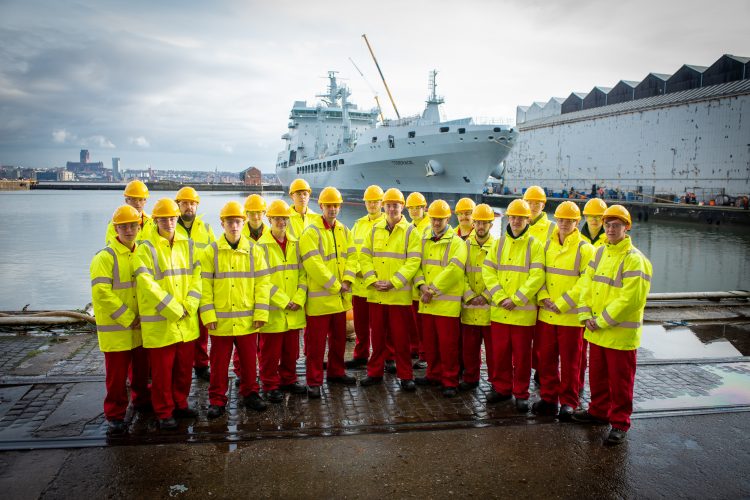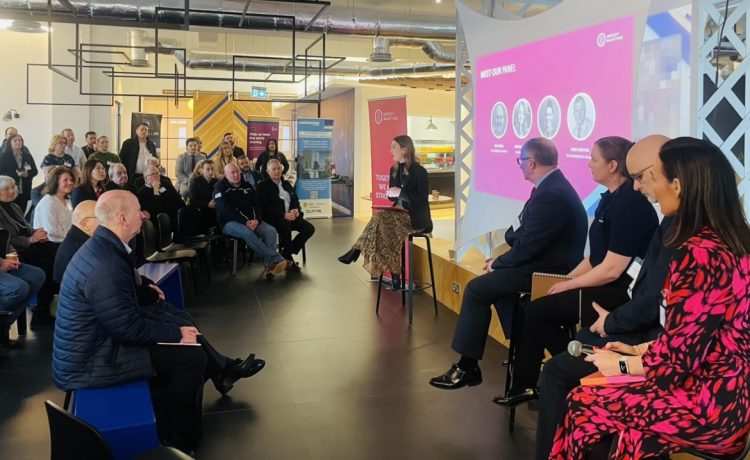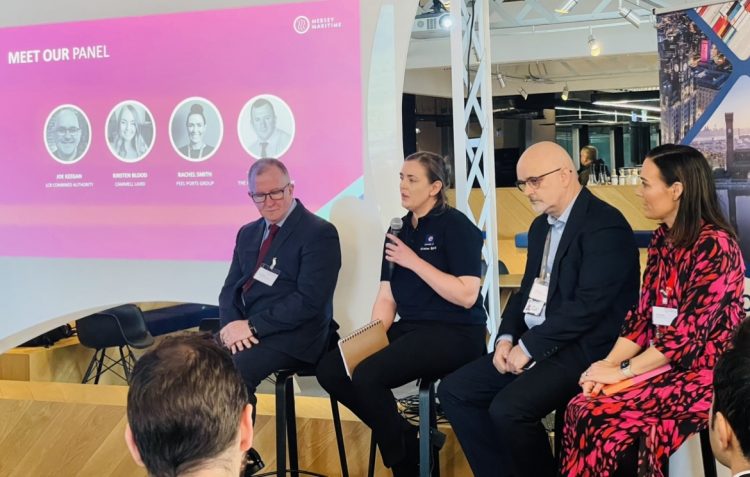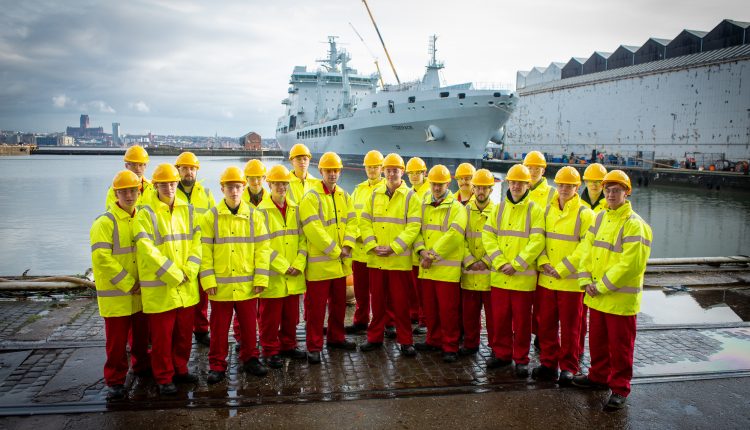Apprentices vital to growth of £5bn maritime sector
Liverpool city region’s maritime sector has grown significantly in recent years and is now worth more than £5bn a year – but one of its biggest challenges is recruitment and retention. Tony McDonough reports

“How do we attract the next generation of talent to work in the maritime and engineering sector?”
That was the question posed by Mersey Maritime chief executive Ruth Wood as she opened a panel discussion in Liverpool city centre to mark National Apprenticeship Week 2024 earlier this month.
For February Mersey Maritime took its monthly Face-2-Face networking breakfast on the road. This month’s lively discussion on apprenticeships taking place at the Everton Stadium project headquarters at the iconic Royal Liver Building.
In front of a packed audience, Ruth introduced the four-strong panel that was drawn from across the public and private sectors:
- Joe Keegan – employer brokerage manager for Liverpool City Region Combined Authority.
- Kirsten Blood, ship manager at Cammell Laird who began her career as a teenage apprentice 14 years ago.
- Rachel Smith, group HR director at Port of Liverpool operator Peel Ports Group.
- Terry Weston, chief executive of The Engineering College in Birkenhead.
Recruitment and retention is one of the key challenges facing employers from all business sectors, particularly in the post-pandemic era. Apprenticeships offer the opportunity to both attract and continually develop talented people.
Impartial advice and guidance
Joe Keegan began by outlining the support that the Combined Authority provides for employers of all sizes who are looking to recruit apprentices or upskill their existing workforce using apprenticeships, which are available right up to Master’s degree level.
He and his team of skills brokers offer a free service to employers across the city region. They begin by sitting down with the employer to understand their skills needs. If the employer is looking to recruit an apprentice they would start by looking at the job description and mapping this to one of hundreds of apprenticeship standards.
“We provide an impartial advice and guidance service,” he explained. “We make sure the employer is getting the right advice. There is some really good advice and support provided by colleges, universities and training providers and there are also some that’s not so good. We have to challenge that.
“We provide a free service, and we are here to act on your behalf.”
Joe also talked about the Apprenticeship Levy, which is paid by businesses with a £3m-plus ‘pay bill’. Often the money raised by the levy goes unspent and ends up in the coffers of the Treasury, lost to the City Region.
He and his team can help larger businesses to support SMEs by transferring unspent levy cash to fund apprenticeships. Since 2019 they have helped oversee the transfer of around £4m.

‘Maritime is so much more than just ships’
Maritime and its 30-plus sub-sectors face the challenge of an ageing workforce and also has to counter the mistaken assumption that it is “all about ships”.
This was a key point made by Rachel Smith, whose job it is to help manage and grow a workforce at Peel Ports, a business that requires a dazzling array of skills and people that can adapt to new and emerging technologies.
“It is incredibly hard to recruit and retain diverse and skilled talent right now,” she said. “This sector in particular has some really unique roles that are difficult to come by. This strengthens the argument for apprenticeships.
“We also know learning and development is one of the main reasons potential employees will have for joining an organisation. It is about building skills and capabilities internally but also about that outreach too.
One of the ways Peel Ports has been working on retention was by setting up its own in-house ‘Learning Academy’ to develop leadership skills. She added: “We need to build the skills for the future.”
She went on: “It is also important that we do outreach work with younger people, so we are going out into schools to talk to as many as possible.
“It is tough to find female talent and diverse talent overall. We work with other external organisations, and we have open days for young people and are seeing an increasing number of attendees for those events.”
‘Apprenticeships are for all ages’
Terry Weston embodies the spirit of training and continuing development. He started his initial engineering apprenticeship when he was 17. He completed his most recent apprenticeship, which secured him an MBA, at the age of 58.
Echoing the “not all about ships” point Terry said The Engineering College, located next door to Cammell Laird shipyard, changed its name in 2016 from the Maritime Engineering College North West.
Many local businesses, and parents, mistakenly believed the college was there to send young people off to sea. Changing its name had the desired effect of letting people know this was the place where you came to become an engineer.
Now the college is oversubscribed every year and now trains around 365 apprentices on behalf of 105 different employers, including Cammell Laird.
Both he and Joe Keegan made the point that apprenticeships are not just for young people, as many people assume. People can take apprenticeships from age 16 and right up to Master’s degree level.
“If I have a message for businesses, it is that the first apprenticeship is a stepping stone. They are no longer a job for life,” said Terry.
“It is all about us making the commitment to give people 20% of time off the job to learn. And it is also important for them to realise that it doesn’t stop after the first apprenticeship.
“My message is that if you have staff who come to you as an apprentice then you can support them to take on new skills and new training later on.”
Terry explained that what the college offers goes beyond just technical training. Sometimes young people arrive at the door having come from a poor or difficult background and its staff have a holistic approach to offering support.
He added: “For some kids there isn’t a push out of the front door. So we go the extra mile with young people.
“We have got challenges with young people coming in, setting off on the right foot but we have to keep them engaged because it is a four-year journey. Their friends may be doing other things and earning more money.
“There are challenges in recruiting and there are challenges in keeping them there. We have to manage their expectations, their parent’s expectations and their employers to get them over the line.
“What we promise them is once they are over the line then their career potential and their earning potential is fantastic because the world needs engineers.
“What can tick the box for them is when you can convince them that they are part of the solution for climate change.”

‘Engineering was completely new to me’
Kirsten Blood, and her employer Cammell Laird, provide an excellent case study into the value of apprenticeships both to individuals and businesses.
She offered the remarkable statistic that up to 80% of current employees at Cammell Laird started off as apprentices, including the current managing director Mike Hill.
Kirsten joined Cammell Laird as a teenager 14 years ago. Today she is a ship manager at the yard. She said: “Looking back as a 16-year-old I really didn’t know what I wanted to do.
“During school years there was very much a push towards A-Levels and university. I followed the crowd for a while and did one year at 6th form, studying for my AS Levels, but I realised then university wasn’t going to be for me.
“I am a creative thinker and I like problem-solving. That was my route onto thinking about engineering and that is what led me to The Engineering College.
“Engineering was completely new to me at 16/17. I was shown a picture of an adjustable spanner and I had no idea what it was. I just got stuck into learning the trade and have loved every minute of it.
“When I applied there was only one other female apprentice, so I am grateful to her for breaking that mould. We were a little duo for a while. Since then, there have been a few more females come through, which is great.
“I did a few career days where I went into school, and it is nice to see more girls coming through – but we definitely need to see more.”
Joe Keegan spoke about the importance of the Be More digital portal provided by the Combined Authority. He said: “This lists all the apprenticeship vacancies across the Liverpool city region.
“And we have a careers hub and they work with the careers leads within schools. It is really important that we build a set of resources highlighting the sectors that young people might be interested in.
“In the past we have held skills shows and we have secured funding to hold more of those in the future.
READ MORE: Mersey hydrogen project… breakthrough or folly?
READ MORE: Cammell Laird back in profit as revenues surge 30%
“Whether it is young people, or unemployed or anyone looking to move through a particular career we will guide them to the Be More site.
“And we are now including occupational maps. So if someone looks up a particular career path they can see how they can move through from being, say, a welder into a more managerial role.
“We need to sell apprenticeships as not just training over a fixed period of time but as a gateway to a real and rewarding career.”

